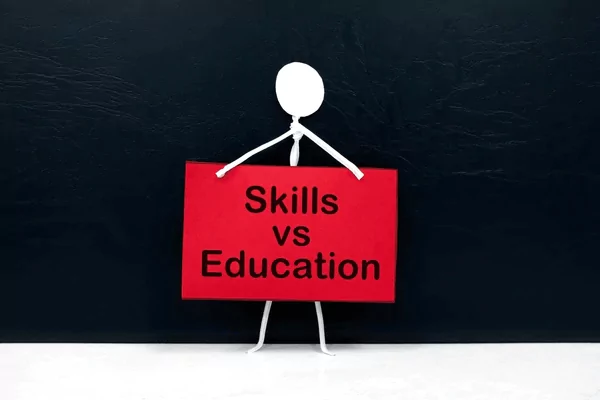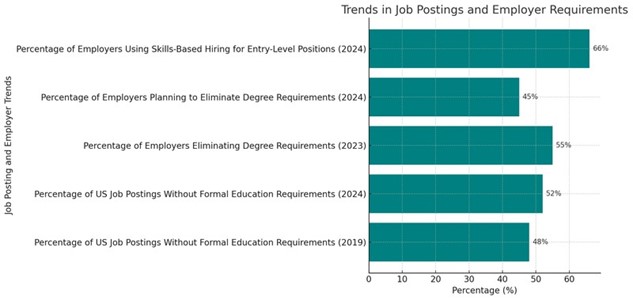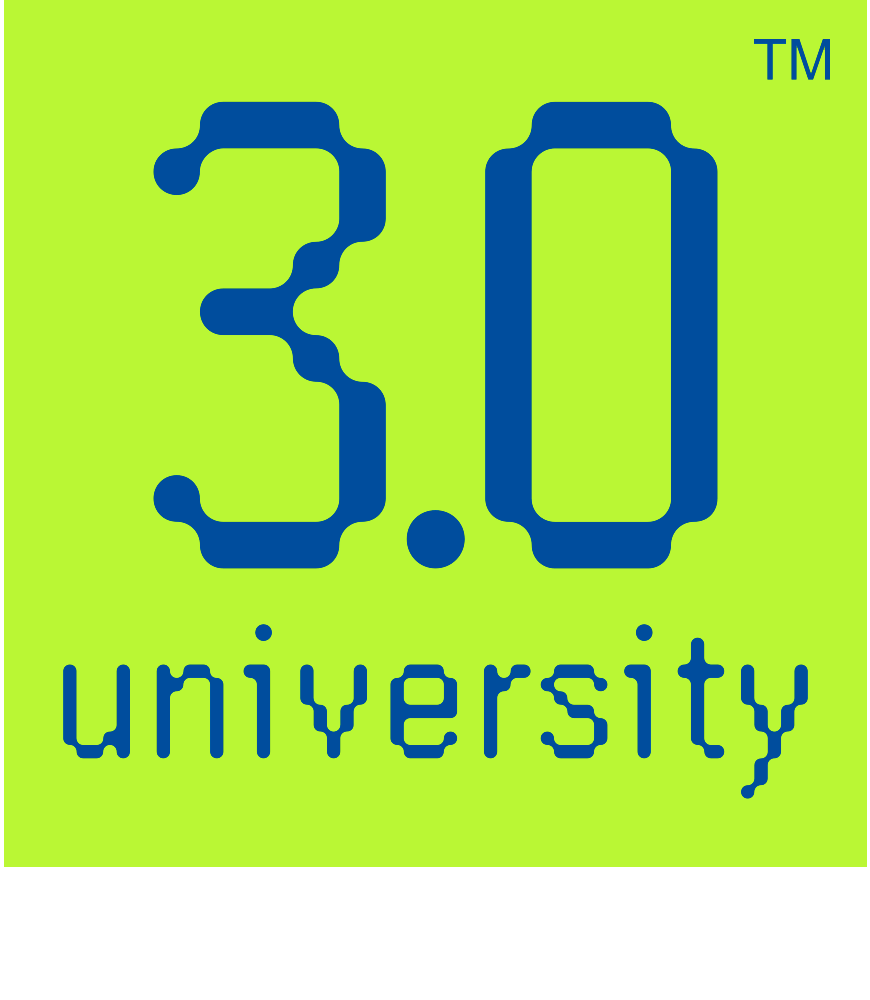
What is more Important Degree or skill?
- Posted by 3.0 University
- Categories Emerging Technology
- Date April 22, 2025
- Comments 0 comment
Is a Degree Still Worth It in the Age of Skill-First Hiring?
The Value of Degrees in Modern Employment
Job markets these days are shifting fast, and people are starting to wonder what really gives you an edge. Nowadays, it seems the old idea of a degree as the ultimate proof of ability is being seriously challenged by hiring trends that prioritize hands-on skills.
Yes- it’s the perennially hovering question – What is degree and skill?
A college diploma often shows you’ve mastered all the theory, but employers increasingly seem to favor the practical know-how that gets the job done—something you might pick up on your own. This confusion leaves us wondering how exactly formal education and on-the-job skills complement each other.
The clear-cut line between book smarts and real-world know-how is blurring, and there’s ongoing chatter about which one carries more weight.
In most cases, some folks argue that lessons learned from direct experience or self-guided learning can trump a degree, especially in tech fields where practical insight can be king.
The other question in succession is – Which is better, skills or degree?
At the end of the day, both elements leave their mark on a career, though in this fast-paced, insight-driven era, practical skills often steal the show—even if a degree still has its kind of shine.
The Rise of Skill-First Hiring Practices
Today’s employment trends are disrupting the traditional hiring practices. Many companies—trying to keep pace with tech’s wild changes—are now giving as much weight to hands-on know-how as to formal degrees.
Most of the time, real-world skills seem to carry more weight than a diploma, a trend some are referring to as degree inflation.
Several major corporations, for instance, recently announced they’re dropping degree prerequisites in many positions, signalling a move away from traditional checklists.
This change isn’t just about broader inclusivity; it also suggests that practical abilities can really drive performance and spark innovation, challenging the long-accepted idea that formal education is the only gold standard.

This bar chart illustrates the trends in job postings and employer requirements in the United States, highlighting the increasing percentage of job postings and employers moving away from formal education requirements in favour of skills-based evaluations. The data indicates a shift towards skill-first hiring practices, with significant changes expected in the coming years.
Comparing the Importance of Degrees and Skills in Career Advancement
The contemporary work environment sparks a vibrant discussion: should one rely more on formal education or practical experience to advance in their career?
For a long time, many saw a degree as the ultimate qualification, demonstrating the fundamental intelligence many jobs supposedly required.
Now, though, industries seem to prize hands-on experience and adaptability more, which makes you wonder: is it better to have a diploma or solid skills?
In most cases, certain fields still dig the old-school theoretical approach, while others, especially in tech and creative circles, are giving extra credit to practical abilities.
Employers now often hunt for solid, demonstrable talent instead of just a fancy piece of paper—suggesting that what you learn by jumping right into the work can outweigh classroom theory.
Ultimately, the modern job scene appears to crave a mix of both, where education and practical experience aren’t rivals but rather partners that boost your career overall.
Source | Statistic | Implication |
U.S. Census Bureau | 36% of workers over age 25 had a bachelor’s degree or higher in 2019 | A significant portion of the workforce lacks a bachelor’s degree, indicating that skills-based hiring can tap into a broader talent pool. |
National Skills Coalition | 53% of all jobs require middle-skills, which involve some postsecondary education and training but not necessarily a four-year degree | A majority of jobs do not require a four-year degree, highlighting the value of skills-based qualifications. |
Association of American Colleges and Universities | Employers value soft skills such as oral communication, critical thinking, ethical judgment, teamwork, and self-motivation, often developed through liberal studies education | Soft skills, which are crucial for career advancement, are often cultivated through degree programs. |
Southern Careers Institute | Skills-based training programs can lead to a career in as little as one to seven months, with most programs completed in 30 to 36 weeks | Skills-based training offers a faster path to employment compared to traditional degree programs. |
University Professional and Continuing Education Association (UPCEA) | The U.S. Labor Department projected a shortfall of more than two million skilled workers by the end of the year, leading employers to seek ‘new-collar’ workers trained through nontraditional education paths | There is a growing demand for workers with specific skills, regardless of formal degrees. |
Comparing the Importance of Degrees and Skills in Career Advancement
The Role of Knowledge in the Degree vs. Skills Debate
And the ‘last-but-not-the-least’ question that looms around strongly – Which is more important, degree or knowledge?
In today’s dynamic job landscape, the integration of knowledge and practical experience has generated significant debate about the continued value of a formal degree.
Back when things were simpler, diplomas were considered the go-to signs of a candidate’s potential and basic know-how—almost like they answered, “What’s the deal with a degree versus skill?”
Lately, though, many employers seem to lean toward candidates who offer concrete skills over academic credentials, and this shift makes you wonder if practical abilities might trump traditional learning.
Generally speaking, this trend hints that being able to show what you can do directly on the job is catching more attention, even if that challenges the old idea that a degree equals expertise.
Still, it’s worth noting that the knowledge you gain in school often lays the groundwork on which those hands-on skills are built.
So, while skills may be stealing the spotlight more these days, the smooth, steady influence of formal education still plays a key role in deepening one’s understanding and adaptability in a pretty complex work world.
Conclusion
Today’s job market is complex, requiring a combination of academic studies and practical experience.
Companies, increasingly, are leaning towards what you can actually do rather than just what your degree might say about you; so, the old debate about a diploma versus hands-on know-how is shifting.
Degrees tend to lay down a basic framework and, in most cases, show that you’re committed to growing, yet the skill of putting knowledge to work often ends up carrying equal or even greater weight.
This change nudges us into rethinking traditional learning paths—blending classroom theory with practical, day-to-day experience appears to be the smart route.
A degree might unlock a door at first, but naturally, it’s the real skills that often sustain a career’s longevity.
Ultimately, the conversation drifts away from simply asking, “Is a degree worthwhile?” and moves toward figuring out how to best mix formal schooling with actual skill development in an ever-evolving job landscape.
You may also like

How AutoML and No-Code AI are Changing Industries?

Zero Trust Architecture: The Future of Enterprise Security

